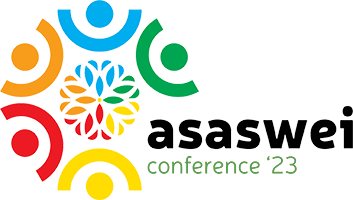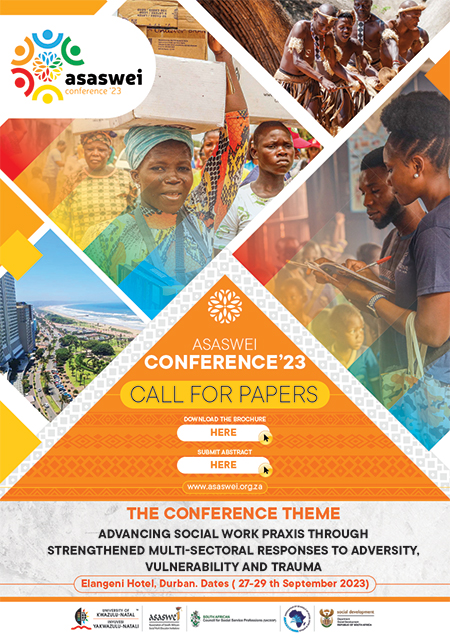The View page displays a submission's general information and data. Watch video
Submission information
Submission Number: 79
Submission ID: 94
Submission UUID: 772b897c-d89d-4cd4-83f9-320ea11a92a6
Submission URI: /2023/abstracts
Created: Mon, 06/19/2023 - 21:32
Completed: Mon, 06/19/2023 - 21:45
Changed: Mon, 07/31/2023 - 18:01
Remote IP address: 102.130.27.39
Submitted by: Anonymous
Language: English
Is draft: No
Current page: Complete
Webform: Abstract
Presenters
Ms.
Mdlankomo
Andiswa Pamella
University of Fort Hare
Bio
Andiswa Pamella Mdlankomo is a Ph.D. candidate in the Social Work Department and Social Development at the University of Fort Hare, South Africa, submitting my thesis, titled: “The Paradox of professional social work service delivery in a resource deprived environment: A critical assessment of the factors that promote or impede the implementation of Batho Pele principles in Buffalo City Metro, Eastern Cape, South Africa”. I am committed and interested in discussing government expectations about improving service delivery in South Africa.
Andiswa Pamella Mdlankomo is a Ph.D. candidate in the Social Work Department and Social Development at the University of Fort Hare, South Africa, submitting my thesis, titled: “The Paradox of professional social work service delivery in a resource deprived environment: A critical assessment of the factors that promote or impede the implementation of Batho Pele principles in Buffalo City Metro, Eastern Cape, South Africa”. I am committed and interested in discussing government expectations about improving service delivery in South Africa.
No
Abstract
Abstract on the title: The protection of physical and psychological health and wellbeing of children, people with disabilities, and older people through fostering safe, sustainable, and inclusive living space.
THEME 1: Promoting stakeholder partnerships that protect, support and enhance resilience during adverse events and trauma
SUB 1.2 The protection of physical and psychological health and wellbeing of children, people with disabilities, and older people through fostering safe, sustainable, and inclusive living spaces
Oral Presentation
Abstract on the title: The protection of physical and psychological health and well-being of children, people with disabilities, and older people through fostering safe, sustainable, and inclusive living spaces.
Andiswa Pamella Mdlankomo: University of Fort Hare ([email protected]), with Hloniphile Khuzwayo: the University of Free State ([email protected]
Abstract: To safeguard the physical and mental health and welfare of vulnerable people, through case studies and evidence-based research, the paper will explore various strategies for fostering safe, sustainable, and inclusive living spaces to promote the health and well-being of these vulnerable populations. This applies to everyone, especially children, people with disabilities, and the elderly, who are more vulnerable to the harmful impacts of a dangerous, unsustainable, and exclusive living situation. Their physical well-being depends on having access to clean water, sanitary facilities, and suitable housing. In contrast, their psychological well-being is enhanced by having opportunities for social interaction and leisure activities. Homes, structures, and public areas must be inclusive, accessible, and barrier-free for people with disabilities. Elderly persons require community services that enable them to age in place with dignity and independence and accessible and affordable housing.
Keywords: Physical well-being, psychological well-being, environmental degradation, vulnerable population, sustainability.
Andiswa Pamella Mdlankomo: University of Fort Hare ([email protected]), with Hloniphile Khuzwayo: the University of Free State ([email protected]
Abstract: To safeguard the physical and mental health and welfare of vulnerable people, through case studies and evidence-based research, the paper will explore various strategies for fostering safe, sustainable, and inclusive living spaces to promote the health and well-being of these vulnerable populations. This applies to everyone, especially children, people with disabilities, and the elderly, who are more vulnerable to the harmful impacts of a dangerous, unsustainable, and exclusive living situation. Their physical well-being depends on having access to clean water, sanitary facilities, and suitable housing. In contrast, their psychological well-being is enhanced by having opportunities for social interaction and leisure activities. Homes, structures, and public areas must be inclusive, accessible, and barrier-free for people with disabilities. Elderly persons require community services that enable them to age in place with dignity and independence and accessible and affordable housing.
Keywords: Physical well-being, psychological well-being, environmental degradation, vulnerable population, sustainability.
Reviewer ONE Feedback
Prof
Reineth
Prinsloo
Somewhat
The absract is very vague; it refers to safe living spaces but is not clear on exactly what is meant. The presenter refers to case studies - is it based on emoirical research or practice? There is also no title for the presentation. A sub-theme cannot be
Rejected
Reviewer TWO Feedback
Dr
Mbongeni
Sithole
Somewhat
No clear focus
Rejected

